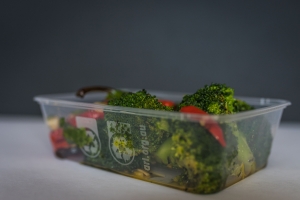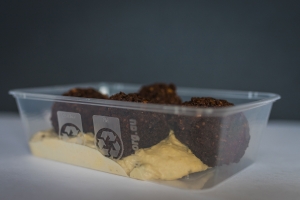Our products and sustainability
Plastics in the modern economy
At Genfac we recognise that plastics have a valuable role to play in a productive and circular economy.
Today plastics are used in a wide range of consumer goods and applications including computers, mobile phones, vehicles, and healthcare products to name but a few. Plastics are widely utilised or incorporated in products because they are durable, lightweight and affordable.
Plastic is often used in food packaging because it has proven to be an effective medium for protecting and preserving goods, delivering high standards of hygiene, whilst also realising numerous circular economy and environmental benefits.
Food packaging and take away containers – finding the pathway to sustainability
At Genfac our focus is on producing safe, quality and fit-for-purpose food packaging products that meet the needs of our customers within the food and beverage sector and that comply with the requisite hygiene and quality standards that govern our industry.
In developing and manufacturing our products we are mindful of the array of materials and choices that we have to fulfill our primary objectives. This includes the use of not only petroleum-based plastics but alternatives such as paper/cardboard or plant-based plastics (PLA)/bioplastics. There is often a widely held mis-conception that the latter two are superior from an environmental and sustainability perspective.
In assessing each alternative and weighing up the pros and cons it is evident that many of the perceived benefits from using paper and plant-based plastics do not consistently materialise in the “real world” settings – as can be seen in the summary below:
- Paper products are often lined with plastic to allow it to hold hot food without breaking down but this renders it unsuitable for kerbside recycling systems currently in place in Australia and so it will typically be destined for landfill. Furthermore plastic-lined paper products are often also not able to be diverted to composting facilities given the composition of the materials used.
- Paper food packaging products in comparison with plastic food packaging are significantly heavier and therefore require more carbon emissions to produce and transport. The heavier the item is, the more fuel/energy that is required to transport it.
- Whilst the paper sourced may come from sustainable plantations the manufacturing of paper products requires chemicals and bleach additives to deliver consistent quality and colour, the waste of which is difficult to filter back to a safe level and is sometimes just dumped.
- Plant-based plastics, despite perceptions, don’t readily degrade in landfill as they require specific heat and moisture conditions. There is potential to separate and capture plant-based waste for diversion to composting facilities however the sorting processes impose additional costs on materials recovery facilities (where sorting takes place) and at present there is not a network of suitable commercial composting facilities around Australia (meaning that much of this waste ends up in landfill). Plant-based plastics can contaminate other plastic recycling streams.
- Bioplastics / plant-based plastics, like all other plastics, will breakdown slowly over time in the environment, and result in the generation of micro plastics, which can be harmful to humans and animals if ingested. Bioplastics/Plant-based plastics are therefore also no less of an issue when they end up in our natural environment and waterways and don’t present as a solution to the problem of marine pollution.
- Some of the world’s largest plant-based plastics manufacturers make their products using genetically modified seed. These crops compete with the use of land for food production purposes and have unknown implications on the environment and human health.
Whilst at Genfac we will continue to trial and innovate, looking at emerging sustainable material alternatives and manufacturing techniques, we are confident that our current approaches provide the best way to deliver on our suitability goals.
Genfac Plastics manufactures its products using only Polypropylene (PP) which is a highly recyclable and high value recycled commodity. There is currently a significant demand for recycled PP and the materials recovery sector is working hard to address this market.
Genfac Plastics has plans to play a “hands on role” by working with our supply chain to improve the overall recovery of PP and in doing so address one of the key concerns facing our industry.
For details of our Sustainable Packaging Strategy please click on the link below:
Sustainable Packaging Strategy
Genfac Plastics, in an Australian first, has become the first Australian Packaging Covenant signatory to gain approval to emboss the Australian Recycling Logo (ARL) on its take-away food packaging range.
Read more:
Media Release




